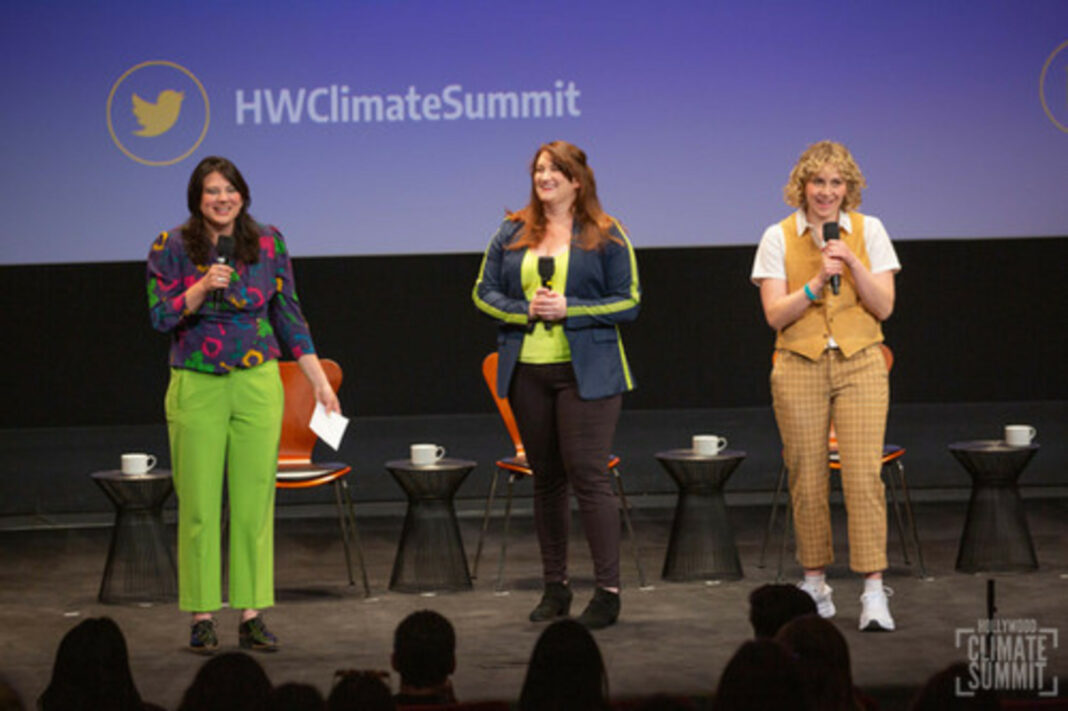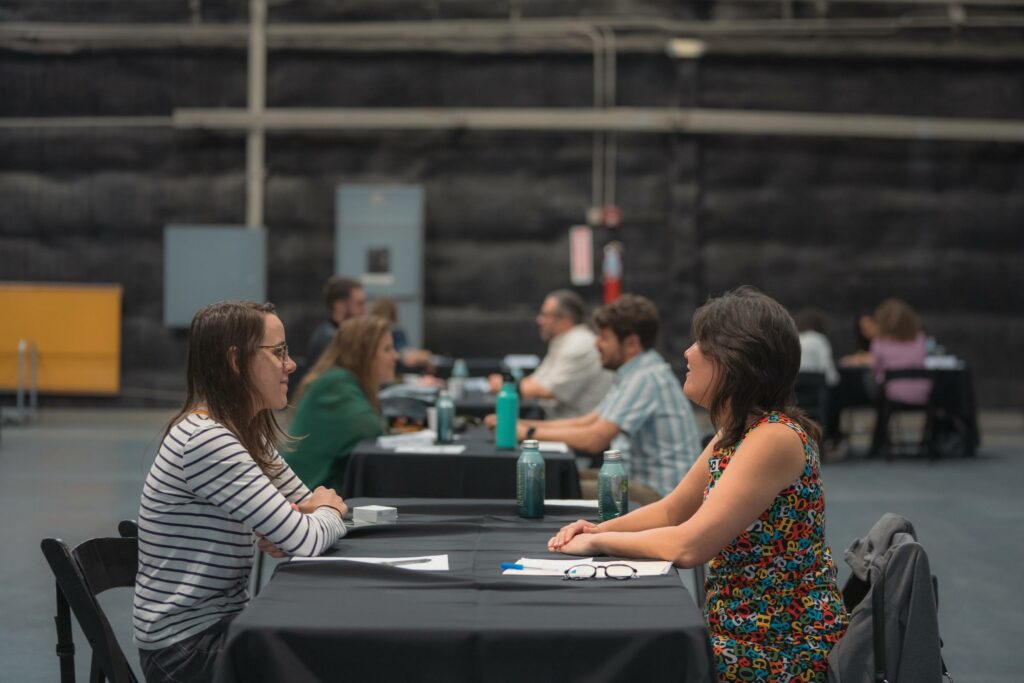Can the Hollywood Climate Summit make climate change bingeable?
It was 2021, and I had just had a baby. This was in the midst of the long “middle” of the pandemic, well after the balcony serenades to first responders had faded, but before widespread vaccinations gave us light at the end of the tunnel. The realities of climate change — my perpetual greatest fear — were, pun intended, heating up. I was terrified for my daughter’s future and convinced I had made a mistake by bringing her into this world. What Earth would this tiny innocent baby be inheriting? At the same time, I was questioning my own career as a comedy writer. Was I making any sort of real contribution to the world? Should I shift careers? Attend protests? Scream at politicians? Instead, I doom scrolled and binge ate.
As my social media feeds turned into a depressing mix of COVID stats, climate gloom, fried Oreo recipes, and fast fashion ads, I stumbled upon a tweet from writing coach Leigh Medeiros about climate storytelling in Hollywood. I had played with the idea of trying to pair my comedy writing with climate storytelling, but the stories that played in my head tended to be bleak, apocalyptic, and scary. (As I mentioned above, I was doing a lot of doom scrolling.) Despite interning at The Daily Show and seeing firsthand how powerful a lens comedy can be, I had never really put the two ideas together. Could climate change be funny? I sent a message to Leigh saying that I was eager to learn more. And that’s how I found out about two things that would change my life — the Hollywood Climate Summit, and its inaugural Writing Climate Pitchfest.
The Hollywood Climate Summit was founded in 2021 to promote climate storytelling in Hollywood. According to a study released from Good Energy and the USC Norman Lear Center’s Media Impact Project, from 2016 to 2020, only 2.8 percent of scripts mentioned climate keywords — meaning that one of the largest threats facing the world today is getting almost no attention in films and shows. The Hollywood Climate Summit aims to confront that disconnect and encourage climate storytelling as a way to affect change. Its Writing Climate Pitchfest is a direct pipeline connecting storytellers from around the world with executives who are interested in finding new and interesting climate stories.
Seeing climate stories, both good and bad, not only more accurately depicts the world we’re living in today, but also can inspire more people to make effective and long-lasting changes for a better planet.
– Diana Wright
With the pitchfest’s deadline only a few days away, I sat down and wrote two pitches. The first was a show based on my favorite civil servants in the local Los Angeles government: the employees of the Department of Sanitation. If anyone was fighting on the front lines of the war with our wastefulness, it was the sanitation workers. The second pitch was based on the billionaire pipe dream of terraforming Mars instead of, you know, fixing up our current planet. I submitted both, and both were accepted in the semifinals. I was thrilled. Ultimately the show concept “Trashed” (about the department of sanitation) was selected to be a finalist, and I presented it to a roomful of executives and production companies dedicated to adding more climate storytelling to their rosters.
The pitchfest and the surrounding Hollywood Climate Summit were, simply put, inspiring. I met producers, writers, and executives — all dedicated to pushing forward messages of climate change. I learned about valuable resources like Good Energy (which literally wrote the playbook on how to write stories in the age of climate change); Pique Action, which bills itself as the opposite of doom scrolling (2021 me could have used this); the NRDC climate storytelling fellowship; and Generation 180’s Climate Comedy Cohort, which pairs comedians with climate scientists to help tell their story. I had spent all of 2021 wondering how exactly I could pair comedy with climate change, and these organizations and the talented people behind them had already put plans into motion to answer that question. I was deeply inspired and more than a bit jealous — often a sign that I’ve stumbled upon amazing talent doing amazing things.
And as in all good Hollywood stories, I lived happily ever after, right? And we didn’t have the hottest summer ever recorded, and we’re all enjoying our car-free cities with our dedicated bike lanes? Not exactly. We haven’t entered an enchanted forest where our fairy godmother turns a pumpkin into a workable carbon capture machine … yet. But the Hollywood Climate Summit has shown me that there are powerful people dedicated to centering climate stories on screens big and small. And it’s no secret that representation matters on screen: it can inspire change, prove to the younger generation what is possible to achieve, and spark political action. Seeing climate stories, both good and bad, not only more accurately depicts the world we’re living in today, but also can inspire more people to make effective and long-lasting changes for a better planet.
Can Hollywood be More than Make Believe?
Hollywood can be a place of hypocritical climate action, such as when celebrities claim to be dedicated to the climate but make frequent trips across the globe on private jets and mega-yachts. The sets of films devoted to a climate message can be littered with plastic water bottles used by its crew. And our most popular shows love to luxuriate in wealth porn — showing off intriguing remote locations, sleek sports cars, and excessive spending. Ali Weinstein, the co-founder/executive producer of the Hollywood Climate Summit and a TV writer herself, states that “there’s no world in which Hollywood is removed from a capitalist system or consumerism. I don’t know that Hollywood will ever be less dependent on advertising. But I do think that there are a lot of ways to feed climate into those messages, whether it’s advertising products that are better for the environment or putting electric vehicles or solar panels into the stories, even in the background.”
But maybe that’s also a beautiful encapsulation of the imperfect environmentalism we should all be embracing. Hollywood has always presented its stories and stars as perfect little gems, but in reality there are hundreds of workers standing just off screen to prop up that supposed perfection. And that, right there, is an apt metaphor for climate action: a community bound together with a singular goal, each doing a small part to make it so.
And just like the growing climate activism movement at large, the Hollywood Climate Summit has grown. Ali Weinstein points out that “our attendance and our sponsors have doubled every single year since the launch in 2021. To me, that’s a huge answer — that there’s a lot more interest, and people really want to come.” Hollywood clearly wants to add climate storytelling to its narratives, and if the people who create, greenlight, and produce media desire it, then it is definitely coming to the big screen.
One thing that I have especially loved about the Hollywood Climate Summit is its awareness of the intersectionality of the climate movement. Their commitment to hosting panels such as Bringing Our Whole Selves: Disability Representation in Climate & Media highlights how climate action affects us all in different and varied ways. This is a problem that will be solved with a thousand different solutions, not just by planting more trees. I highly recommend checking out that panel and the many others listed on the Yea! Impact youtube page to see just how thoughtful the programming was at the most recent Hollywood Climate Summit.
What Makes a Good Climate Story?
Personally, I think the story that I ultimately have in development thanks to the Writing Climate Pitchfest would make a good climate story, and I finally get to talk about it now that the (massively important, in my view) WGA strike has come to an end. (We can discuss how vital unions are in the entertainment industry another day). But besides my TV show — maybe coming soon to a TV or tablet or phone near you — I spoke to Leigh Medeiros (who co-produces the Writing Climate Pitchfest) about what makes a good climate story.
“A lot of people dismiss comedy as superficial or un-serious, but it’s an amazing vehicle to reach people when they’re in a receptive state, so I’d love to see more comedies that include climate issues,” Medeiros says. “Beyond that, we’re ready for more stories by and about indigenous people and stories that focus on environmental justice.” (Speaking of comedy shows focused on climate change, might I recommend Pique Action’s Unf*cking the Planet, starring Hazel Thayer — the Last Week Tonight response to climate change.)
One of Leigh’s favorite examples of a current show addressing climate change is the children's series Octonauts: Above and Beyond. “Every episode features a diverse team of characters working to solve or mitigate a climate issue and its effects,” she says. “Though each story is resolved in a positive way, the writers take care not to leave the audience with the impression that everything is fixed. It’s a show that educates, but also leaves you feeling energized as opposed to depleted.” Medeiros definitely hits upon a key to climate storytelling: it’s easy to focus on the negative, scary elements of climate change, but it’s ultimately more rewarding for the storytelling and the audience to also focus on positive changes and actions.
And as audiences and creators shift, we are seeing a slight change in climate storytelling. As the Sierra Club details in the recent piece We Don't Need Another Green Anti-Hero, we are seeing a shift from the eco activist being portrayed as a villain, to their being celebrated. Adam McKay’s Don’t Look Up has been heralded as a turning point in climate storytelling. Now, the talented director and producer has launched a production company dedicated to climate storytelling called Yellow Dot. All of these developments point to a serious shift in how our changing climate is changing the media landscape.
I remember once, early in my writing journey, I remarked to a more experienced writer that it seemed silly for us to be creating stories. She said “No, the world will always need storytellers, the world will always need to be reminded of what can be.” At the time, I rolled my eyes, but now I see it clearly. And obviously Leigh Medeiros knows the power of storytellers in the fight for climate action: “Storytellers have an opportunity to present us with new, heightened possibilities for our future. Once we see those powerful possibilities, we can begin to believe them.”
I can’t wait to see more climate action on screen. Because representation matters. And showing what we can do to change the world for the better makes us believe it’s possible.
And, besides, popcorn is vegan.





Spectacular article, Diana. So grateful for your insights and can’t wait to see your show!